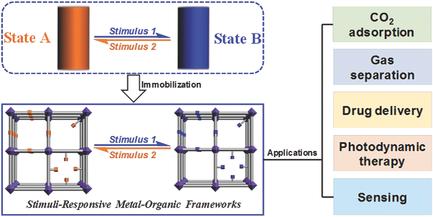当前位置:
X-MOL 学术
›
Macromol. Rapid Commun.
›
论文详情
Our official English website, www.x-mol.net, welcomes your
feedback! (Note: you will need to create a separate account there.)
Immobilizing Organic‐Based Molecular Switches into Metal–Organic Frameworks: A Promising Strategy for Switching in Solid State
Macromolecular Rapid Communications ( IF 4.2 ) Pub Date : 2017-09-14 , DOI: 10.1002/marc.201700388 Bo Gui 1 , Yi Meng 1 , Yang Xie 1 , Ke Du 2 , Andrew C.‐H. Sue 2 , Cheng Wang 1
Macromolecular Rapid Communications ( IF 4.2 ) Pub Date : 2017-09-14 , DOI: 10.1002/marc.201700388 Bo Gui 1 , Yi Meng 1 , Yang Xie 1 , Ke Du 2 , Andrew C.‐H. Sue 2 , Cheng Wang 1
Affiliation

|
Organic‐based molecular switches (OMS) are essential components for the ultimate miniaturization of nanoscale electronics and devices. For practical applications, it is often necessary for OMS to be incorporated into functional solid‐state materials. However, the switching characteristics of OMS in solution are usually not transferrable to the solid state, presumably because of spatial confinement or inefficient conversion in densely packed solid phase. A promising way to circumvent this issue is harboring the functional OMS within the robust and porous environment of metal–organic frameworks (MOFs) as their organic components. In this feature article, recent research progress of OMS‐based MOFs is briefly summarized. The switching behaviors of OMS under different stimuli (e.g., light, redox, pH, etc.) in the MOF state are first introduced. After that, the technological applications of these OMS‐based MOFs in different areas, including CO2 adsorption, gas separation, drug delivery, photodynamic therapy, and sensing, are outlined. Finally, perspectives and future challenges are discussed in the conclusion.
中文翻译:

将基于有机物的分子开关固定在金属-有机框架中:固态开关的有前途的策略
基于有机物的分子开关(OMS)是使纳米级电子产品和设备最终最小化的基本组件。对于实际应用,通常需要将OMS合并到功能性固态材料中。但是,溶液中OMS的转换特性通常不能转换为固态,这可能是由于在密堆积固相中的空间限制或转换效率低下。解决该问题的一种有前途的方法是将功能性OMS保留在金属有机框架(MOF)的坚固多孔环境中作为其有机成分。在这篇专题文章中,简要总结了基于OMS的MOF的最新研究进展。首先介绍了在MOF状态下OMS在不同刺激(例如光,氧化还原,pH等)下的切换行为。概述了2种吸附,气体分离,药物输送,光动力疗法和传感。最后,结论中讨论了观点和未来挑战。
更新日期:2017-09-14
中文翻译:

将基于有机物的分子开关固定在金属-有机框架中:固态开关的有前途的策略
基于有机物的分子开关(OMS)是使纳米级电子产品和设备最终最小化的基本组件。对于实际应用,通常需要将OMS合并到功能性固态材料中。但是,溶液中OMS的转换特性通常不能转换为固态,这可能是由于在密堆积固相中的空间限制或转换效率低下。解决该问题的一种有前途的方法是将功能性OMS保留在金属有机框架(MOF)的坚固多孔环境中作为其有机成分。在这篇专题文章中,简要总结了基于OMS的MOF的最新研究进展。首先介绍了在MOF状态下OMS在不同刺激(例如光,氧化还原,pH等)下的切换行为。概述了2种吸附,气体分离,药物输送,光动力疗法和传感。最后,结论中讨论了观点和未来挑战。









































 京公网安备 11010802027423号
京公网安备 11010802027423号